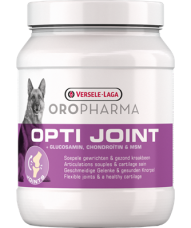TIPS TO RECOGNIZE AND PREVENT JOINT PROBLEMS IN YOUR DOG

Is your dog also suffering from joint problems? The joints of dogs are especially sensitive at the hips, elbows, knees, and lower back. Some dogs suffer more than others but in the end one in five struggles with it. How do you recognize problems with your dog's joints, and how do you fix them?
-
If your dog belongs to one of the following categories, he/she may experience joint problems at some point:
-
Fast-growing puppies of large breeds
-
Heavier dog breeds
-
Dogs that take part in intense (sporting) activities
-
Overweight dogs
-
Older dogs
HOW DO YOU RECOGNIZE JOINT PROBLEMS
Joint problems in a dog may be very subtle, making them difficult to spot immediately. The following symptoms may be the writing on the wall:
-
Stiffness after a long rest or after a long walk.
-
Being less mobile and having trouble jumping in and out of the car, climbing stairs, standing up, or taking long walks.
-
JOINT PROBLEMS IN A DOG MAY BE VERY SUBTLE, MAKING THEM DIFFICULT TO SPOT RIGHT AWAY.
TIPS TO KEEP YOUR DOG'S JOINTS FIT AND HEALTHY
-
Ensure that puppies of large breeds don’t grow too fast by giving them the right nutrition right from the start. Opti Life Puppy Max, balanced puppy food for large breeds, ensures that bones and joints don’t develop too quickly.
-
Avoid obesity by choosing food adapted to your dog's age, size, breed, and activity. For overweight dogs, you’ll also find light products from our Opti Life range for small and medium to large breeds. That food with a specific Opti Weight formula has a lower energy and fat content than regular food.
-
Get into the habit of taking several short walks with your dog daily instead of the occasional long walk. Definitely do this with puppies, and if necessary set a time limit on those walks.
-
Avoid putting excessive stress on dog joints, such as jumping high or stopping abruptly, to avoid joint problems.
-
A slippery floor can be treacherous for your dog. Prevent it from slipping and lay a carpet if necessary.
-
Give the dietary supplement Opti Joint on a regular basis. This includes glucosamine, omega 3 fatty acids, vitamin C, and other important building blocks that can help prevent problems with dog joints (such as osteoarthritis).
-
Are you worried about the severity of the joint problems? Be sure to consult your vet to have your dog examined further!
PREVENT JOINT PROBLEMS IN YOUR DOG WITH OPTI JOINT
Many dogs can experience painful joints at some point. You would think that a dog only gets problems with its joints when it is older. But this can also occur in puppies of large and fast-growing breeds.
EXTRA STRAIN
Your dog can put extra stress on his/her joints if he/she does a lot of sports or is overweight. Fortunately, there’s a remedy to keep your dog's joints flexible.
DIETARY SUPPLEMENT OPTI JOINT
Versele-Laga developed the dietary supplement Oropharma Opti Joint. Opti Joint contains the essential building blocks for the production of articular cartilage but also protects the joints of your dog.
EASY TO ADMINISTER
Opti Joint is in powder form. The best dose to give your dog depends on his/her body weight. Preferably, spread them evenly over the different meals of the day.

Related Products
Opti Joint Dietary Supplement for Supple Joints - 700 Grams
Dietary supplement for supple joints Oropharma Opti Joint supports the quality and smooth functioning of the joints. Contains the building blocks for strong an..
AED 162.00








